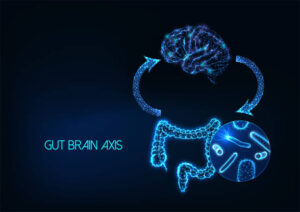
Ever wonder where feelings of pure happiness and contentment arise from? That relaxing feeling after a day at the spa. Or the satisfaction that fills you upon waking from a nourishing night of sleep. Even that sense of tranquil clarity that arises when you feel serene with the present moment. Or the engaged focus you have when you feel completely immersed in doing what you love.
These phenomena are all thanks to a fascinating neurotransmitter called serotonin. This chemical is not only responsible for feelings of calmness, happiness, and focus. It also plays an important role in modulating your mood, perception, memory, and attention. Serotonin is an integral part of a vast array of bodily functions and behaviors. It impacts your stress response, appetite, sleep cycle, and body temperature. Along with this even affects your sexuality.
What is serotonin and what does it do?
Serotonin is often thought of as the “feel good” neurotransmitter. Neurons in the midline of the brain stem make most of the serotonin in the central nervous system. These neurons create the largest and most complex network of efferent nerves. This giant network of nerves extends from the brain to various organs, tissues, and parts of the body. Almost every cell in the brain is near a serotonergic nerve fiber. As so serotonin from these neurons sends messages to other nearby neurons. This signals other areas of the central nervous system as well as the peripheral nervous system. Hence serotonin is pivotal in directing many brain functions and almost all behaviors.
As mentioned, serotonin carries signals between neurons. It helps modulate and regulate the activity of other neurons in the CNS. This influences sensation and various physiological processes. Among many, one is to prepare the gut for digestion. In this manner, serotonin facilitates nerve signaling and communication along a bidirectional path between the central and enteric nervous systems. The ENS is the largest and most complex part of the peripheral nervous system. It is a mesh-like set of nerves nestled within the GI tract. The ENS facilitates motor, sensory, absorptive, and secretory functions in the gut. The biochemical signaling between nerves in the gut and the brain is referred to as the gut-brain axis. This communication allows your stomach to tell your brain you are full.

Other physiological processes involving serotonin are vascular and cardiovascular functioning. Serotonin constricts or dilates vessels based on the kind of receptor it activates. Research shows that serotonin modulates heart function via electrical conduction and valvular closure. Serotonin is even found in platelets, which are tiny clotting fragments in the blood. Here it activates injured blood vessels to constrict and form clots to stop bleeding.
How Does Serotonin Affect the Gut?
Moreover, the vast majority of serotonin is produced in the gut. Over 90% of total body serotonin comes from enterochromaffin cells in the intestines. Here in the GI tract, it acts as a hormone by assisting with the digestive process. It directs hormonal, autocrine, paracrine, and endocrine actions. When you savor a bite of mouthwatering food, salivary glands activate sensory nerves. These sensory nerves then send information from the CNS to the gut to prepare for digestion.
Furthermore, serotonin helps to move bits of food throughout the gastrointestinal tract. It contributes to intestinal motility and peristalsis by contracting smooth muscles. Likewise, serotonin aids the intestines by stimulating the secretion of electrolytes and fluids. This helps the body get rid of waste. Serotonin also allows you to sense pain or fullness from the food you eat.
How Does the Gut Microbiome Influence Serotonin Levels?
Speaking of food, every bite you eat gives the bugs in your belly something to dine on. In turn, some of your gut buddies use this to produce serotonin. These little bugs or microbes break down bits of food into proteins and metabolites. To break down food into serotonin they first need the essential acid, tryptophan. Tryptophan is the necessary precursor to serotonin. Without it, the body cannot make serotonin.
On the same note, the body doesn’t generate tryptophan on its own. So we must consume tryptophan through the food we eat to make serotonin. Along with this, other types of microbes in the gut can compete for tryptophan for other bodily processes. This means your gut microbiota can influence the availability of tryptophan. With more or less available tryptophan, there is more or less serotonin produced. To add to this, your microbiota interacts with the enterochromaffin cells that make serotonin. This impacts the amount of serotonin that the gut lining releases. Hence your diet and the types of foods you eat can affect your microbiome and serotonin levels.
There are many intricate connections between nerves, the GI tract, and microbiota. Just as your gut bugs can influence your serotonin levels, your serotonin can also affect your gut bugs. Serotonin can influence the composition and function of the gut microbiota. It can affect the growth and survival of specific bacteria, thus shaping the microbial community in the gut. Changes in serotonin levels can impact the diversity and balance of the microbiome, potentially leading to alterations in gut health and overall well-being.
How Does the Gut Affect the Brain?
As mentioned, the gut is a key contributor of serotonin in the body. Disturbances in the gut microbiota can disrupt serotonin levels. This also can affect nerve signaling and communication between the gut and brain. In the same vein, this impacts serotonin functioning in the brain. Functional disorders of the gut-brain axis reflect gut microbiota disturbances. Gastrointestinal disorders, depression, and even autism all reflect an imbalance of gut microbiota.
As you can see these microbes are influential in keeping the peace within the brain and body. They influence serotonin levels in both the brain and the gut. As serotonin is a player in both the CNS and GI tract, the gut-brain axis serves as a highway for communication between the central and enteric nervous systems. This links emotional and cognitive functions in the brain with peripheral functioning in the intestines and other parts of the body. As mentioned, fascinating research shows that the gut microbiome facilitates how communication happens. These gut microbes impact serotonin transmission in the brain. In turn, affecting behaviors associated with this signaling.
How Do I Know If My Serotonin Levels Are Low?
As you can see, serotonin is an integral player in sustaining our bodies and health. Research shows that low levels of serotonin often occur with depression and anxiety. Other symptoms of low serotonin are negative thoughts, irritability, low energy, and fatigue. Even gastrointestinal issues like irritable bowel disorder can be reflective of low serotonin. Furthermore, problems with sleeping, panic disorders, schizophrenia, and OCD may reflect low serotonin.
Although, many of these above-mentioned issues can be due to a myriad of issues. It is easy to start self-diagnosing based on a symptom checklist. Even if low serotonin is a key contributor to these issues, there are often times other variables influencing these symptoms as well. There are blood tests available that measure the amount of serotonin you have. Yet these are for identifying serotonin-secreting tumors outside the brain. They do not accurately affect how much serotonin is in your brain. In the end, you know you and your body best. If you are experiencing symptoms that reflect low serotonin consult with your doctor or healthcare professional. Eat foods that increase serotonin levels. And check out this post on How to Boost Your Serotonin Naturally.

Thank you for every other wonderful post. Where else may anyone get
that kind of information in such a perfect manner of writing?
I’ve a presentation next week, and I’m on the look for such info.
Thank you! Sorry for the late response. Your comment has ignited a newfound inspiration to continue working on this blog I almost forgot about. I hope your presentation went well! As to your question I did a handful of google searches to find key functions and body parts that serotonin plays a role in. Then I outlined points that tie back to it like talking about gut, heart, and immune health. If you are doing another presentation at some point I recommend brainstorming things you find fascinating or are curious about. Google them and see if they may somehow connect or relate to the main theme of your presentation. When you start crafting it you can prompt a tool like chat GPT https://chat.openai.com/ as a spring board to get your ideas laid out. You can also use Hemingway Editor https://hemingwayapp.com/ to see how your writing is coming across to the reader. They make suggestions that you can use to make your words and phrases sound clear and more understandable.